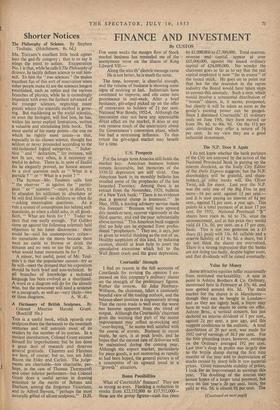Shorter Notices
The Philosophy of Science. By Stephen Touhnin. (Hutchinson. 8s. 6d.) MR. TOULMIN'S excellent little book comes into the gad-fly category ; that is to say it stings the mind to action. Exasperation No.1 is that, while he calls it The Philosophy of Science, he tacitly defines science to suit him- self. To him the "true sciences" (he makes excellent fun of this sort of reservation' when other people make it) are the sciences longest established, such as optics and the various branches of physics, while he is exceedingly impatient with even the farthest advanced of the younger sciences, neglecting many points where the scientific method is grow- ing. But maddening as the social scientist, or even the biologist, will find him, he has, within his never explicit limitations, written a valuable and stimulating little book. The most useful of his many points—the one on which he rightly most insists—is that, especially in his chosen science, thought has seldom or never proceeded according to the old-fashioned logical categories. " Induc- tion " and " deduction," for instance, will -not fit nor, very often, is it necessary or useful to define. There is, in spite of Euclid (as he elegantly proves), no honest answer to a civil question such as " What is a Particle ? " or " What is a point ? "
The layman—Mr. Toulmin . calls him " the observer " as against the " partici- pant " or " scientist '—must, in short, try to abandon his addiction to absolutes or he will find himself—as children so often do —asking meaningless questions. As' a rule a system of assumptions lies behind such questions, as when a child asks, in all good- faith, " What are birds for ? " Today we spot that one easily enough. Yet Galileo came up against the following solemnly held objection to his lunar discoveries : there could be—said his contemporary critics— no mountains on the moon because there were no cattle to browse or drink the streams and no men to use the cattle. So What would lunar mountains be for ?
A minor, but useful, point of Mr. Toul- min's is that the populariser cannot—try as he will—meet the demand that his exposition should be both brief and non-technical. In all branches of knowledge a technical language has been evolved as a shorthand. A word or a diagram will do for the already wise, but the newcomer will need a sentence or a paragraph, as well as—very likely—two


































 Previous page
Previous page